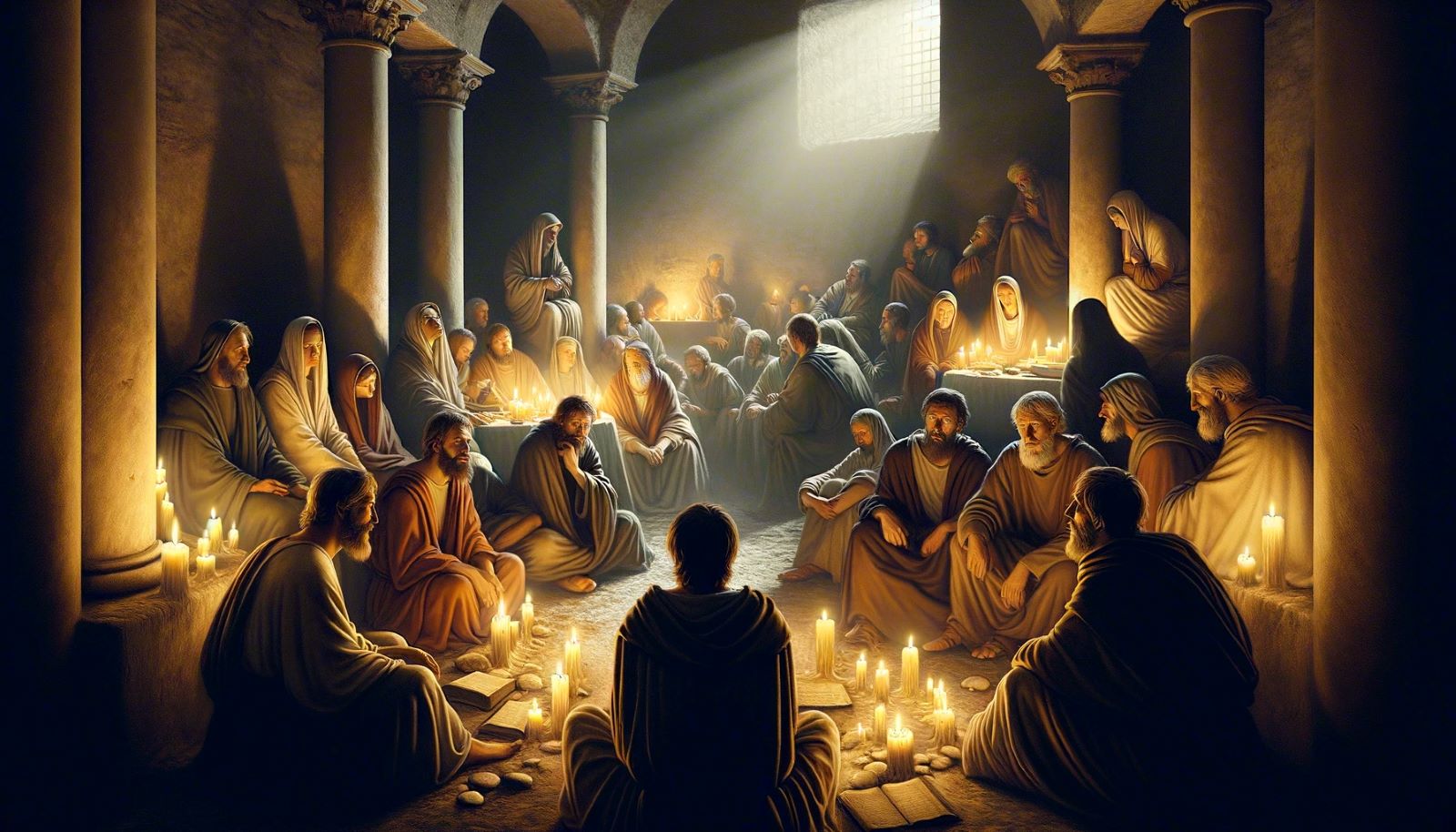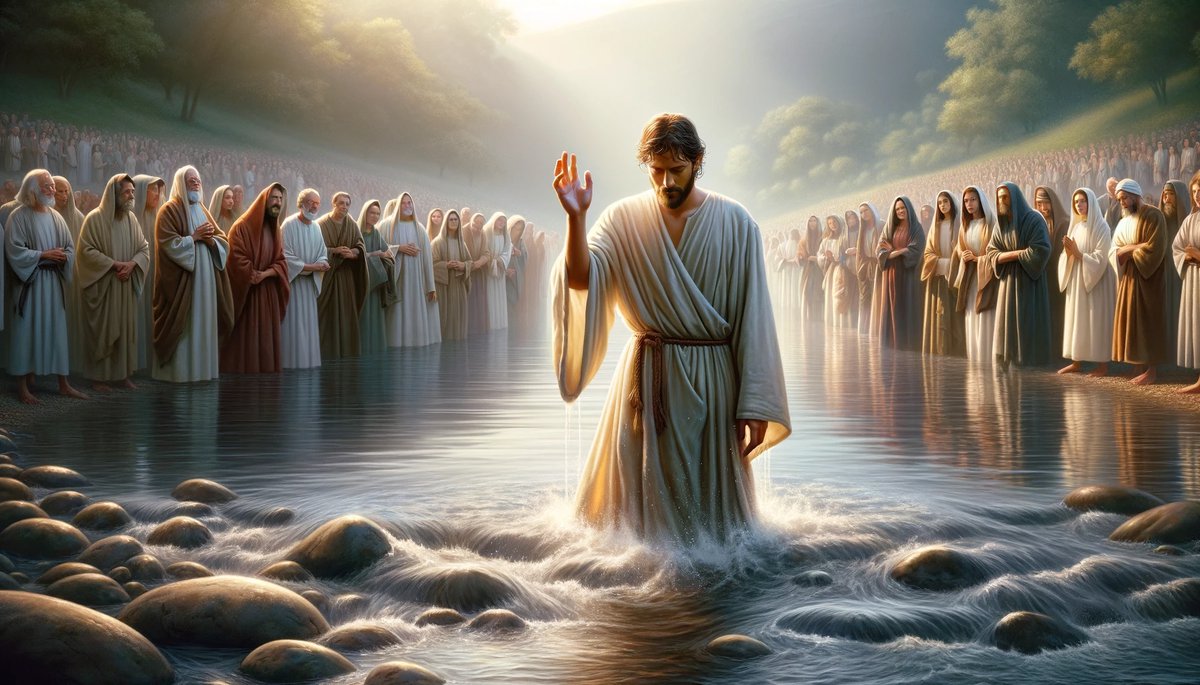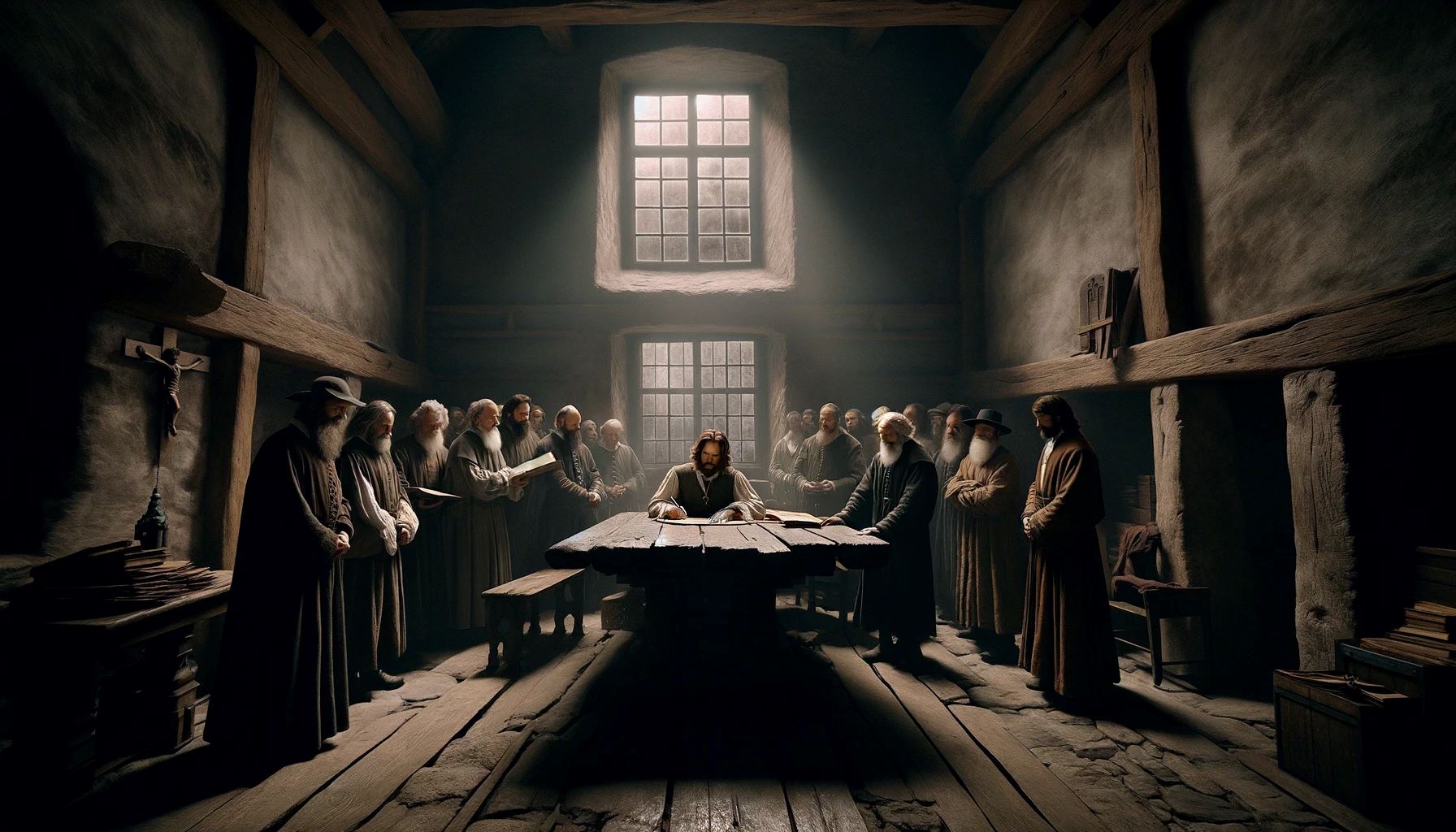Home>Theology and Spirituality>Who Wrote The Baptist Faith And Message


Theology and Spirituality
Who Wrote The Baptist Faith And Message
Published: February 21, 2024
Jason DeRose, Managing Editor at Christian.net, uses his expertise in religion and journalism to deepen understanding of faith's societal impacts. His editorial leadership, coupled with a strong academic background, enriches the platform’s diverse content, earning him recognition in both journalism and religious circles.
Discover the author of The Baptist Faith and Message and explore its impact on theology and spirituality. Learn about the influential figures behind this significant document.
(Many of the links in this article redirect to a specific reviewed product. Your purchase of these products through affiliate links helps to generate commission for Christian.net, at no extra cost. Learn more)
Table of Contents
Introduction
The Baptist Faith and Message holds a significant place in the history and theology of the Southern Baptist Convention. It serves as a statement of the beliefs and doctrines that guide the denomination, providing a framework for understanding the Baptist faith and its principles. Understanding the origins and authorship of the Baptist Faith and Message is crucial in comprehending its theological significance and the impact it has had on the Southern Baptist Convention and beyond.
The Baptist Faith and Message has evolved over time, reflecting the theological convictions and doctrinal positions of the Southern Baptist Convention. Exploring its historical background, original authors, revisions, and controversies surrounding its authorship sheds light on the intricate tapestry of beliefs and values that have shaped the denomination. This exploration not only provides insight into the theological underpinnings of the Southern Baptist Convention but also offers a glimpse into the dynamic nature of religious doctrine and interpretation.
Delving into the authorship of the Baptist Faith and Message unveils the individuals and theological influences that have contributed to its formation and development. It invites us to consider the diverse perspectives and theological debates that have shaped the doctrinal statement, highlighting the complexities inherent in articulating a comprehensive statement of faith for a denomination as diverse and expansive as the Southern Baptist Convention.
As we embark on this journey to unravel the origins and authorship of the Baptist Faith and Message, we will gain a deeper appreciation for the rich theological heritage that undergirds the Southern Baptist Convention and discover the profound impact of this doctrinal statement on the faith and practice of millions of believers within the denomination.
Read more: What Is The Baptist Faith And Message
Historical Background of the Baptist Faith and Message
The historical backdrop of the Baptist Faith and Message is rooted in the evolution of Baptist theology and the Southern Baptist Convention's quest to articulate its doctrinal positions. The Southern Baptist Convention, founded in 1845, sought to establish a statement of faith that would encapsulate its core beliefs and provide a doctrinal foundation for its member churches. This endeavor led to the creation of the Baptist Faith and Message, which has undergone significant developments and revisions over the years.
The early decades of the Southern Baptist Convention saw a diversity of theological perspectives within the denomination, reflecting the broader spectrum of Baptist beliefs. As theological debates and doctrinal differences emerged, the need for a unifying statement of faith became increasingly apparent. In response to this need, the Baptist Faith and Message was adopted in 1925 at the annual meeting of the Southern Baptist Convention in Memphis, Tennessee.
The original version of the Baptist Faith and Message was a concise yet comprehensive declaration of the fundamental tenets of the Baptist faith, addressing key theological doctrines such as the authority of Scripture, the Trinity, salvation, and the church. It served as a guiding document for Southern Baptists, providing a doctrinal framework that reflected their theological convictions and beliefs.
Over time, the Baptist Faith and Message underwent revisions to accommodate the changing theological landscape and address emerging doctrinal concerns within the Southern Baptist Convention. Notable revisions occurred in 1963 and 2000, reflecting the denomination's ongoing engagement with theological issues and its commitment to articulating its beliefs in a relevant and meaningful manner.
The historical background of the Baptist Faith and Message underscores the dynamic nature of theological discourse within the Southern Baptist Convention and the broader Baptist tradition. It reflects the denomination's commitment to preserving its doctrinal heritage while remaining responsive to the theological challenges of the contemporary world. The evolution of the Baptist Faith and Message stands as a testament to the enduring vitality of Baptist theology and the ongoing quest to articulate the beliefs that define the Southern Baptist Convention.
This historical context provides a foundation for understanding the significance of the Baptist Faith and Message and the theological currents that have shaped its development. It invites us to appreciate the rich tapestry of Baptist theology and the enduring legacy of doctrinal reflection within the Southern Baptist Convention.
The Original Authors of the Baptist Faith and Message
The original authors of the Baptist Faith and Message were a group of esteemed theologians and Baptist leaders who were tasked with the responsibility of crafting a comprehensive statement of faith for the Southern Baptist Convention. The development of this doctrinal statement was a collaborative effort that drew upon the theological expertise and doctrinal insights of these individuals, reflecting the diverse yet cohesive nature of Baptist theology within the denomination.
One of the key figures involved in the authorship of the Baptist Faith and Message was E. Y. Mullins, a prominent Baptist theologian who played a pivotal role in shaping the theological landscape of the Southern Baptist Convention during the early 20th century. Mullins' profound theological acumen and commitment to Baptist principles made him a central figure in the formulation of the Baptist Faith and Message. His influence and leadership contributed significantly to the theological articulation of the denomination's core beliefs, leaving an indelible mark on the doctrinal statement.
Additionally, Edgar Young Mullins, the president of the Southern Baptist Theological Seminary, was instrumental in providing theological guidance and scholarly input during the drafting of the Baptist Faith and Message. His deep understanding of Baptist heritage and his commitment to preserving the distinctives of Baptist theology enriched the doctrinal statement, ensuring that it resonated with the denomination's theological ethos.
Furthermore, other notable Baptist leaders and theologians, including George W. Truett, John Broadus, and B. H. Carroll, made invaluable contributions to the authorship of the Baptist Faith and Message. Their collective wisdom, theological insight, and dedication to the Baptist tradition were instrumental in shaping the doctrinal contours of the statement, reflecting the collaborative spirit that characterized the endeavor.
The original authors of the Baptist Faith and Message brought together their theological expertise, doctrinal convictions, and commitment to Baptist principles to create a statement of faith that encapsulated the core beliefs of the Southern Baptist Convention. Their collective authorship reflected a deep reverence for Baptist heritage and a shared commitment to articulating the theological distinctives that defined the denomination. The enduring legacy of these original authors is evident in the enduring theological impact of the Baptist Faith and Message, which continues to shape the faith and practice of Southern Baptists today.
This section provides a glimpse into the esteemed theologians and Baptist leaders who played a pivotal role in the authorship of the Baptist Faith and Message, underscoring their profound influence on the theological identity of the Southern Baptist Convention.
Revisions and Updates to the Baptist Faith and Message
The Baptist Faith and Message has undergone significant revisions and updates throughout its history, reflecting the Southern Baptist Convention's commitment to theological reflection, doctrinal clarity, and relevance in a changing world. These revisions have been instrumental in addressing emerging theological challenges, reaffirming core beliefs, and ensuring that the doctrinal statement remains a faithful expression of the denomination's convictions.
In 1963, the Southern Baptist Convention approved a revised version of the Baptist Faith and Message, marking a significant milestone in the evolution of the doctrinal statement. This revision sought to provide a more comprehensive articulation of Baptist beliefs, addressing theological nuances and doctrinal emphases that had become increasingly relevant within the denomination. The 1963 revision reflected the Southern Baptist Convention's engagement with theological developments and its commitment to upholding the timeless truths of the Baptist faith in a contemporary context.
The most substantial update to the Baptist Faith and Message occurred in 2000, signifying a concerted effort to reaffirm the denomination's theological identity and address pressing doctrinal issues. This revision involved a thorough review of the doctrinal statement, resulting in substantive changes that reflected the evolving theological landscape and the denomination's desire to articulate its beliefs with clarity and precision. The 2000 revision underscored the Southern Baptist Convention's commitment to theological fidelity, doctrinal integrity, and relevance in a rapidly changing cultural and theological milieu.
The revisions and updates to the Baptist Faith and Message have been guided by a deep sense of theological stewardship, reflecting the denomination's commitment to preserving its doctrinal heritage while remaining responsive to the challenges of the present age. These revisions have served to reaffirm the core beliefs of the Southern Baptist Convention, address theological ambiguities, and provide a robust theological framework for guiding the faith and practice of Southern Baptists.
Furthermore, the process of revising the Baptist Faith and Message has been characterized by a spirit of collaboration, drawing upon the expertise of theologians, pastors, and denominational leaders to ensure that the doctrinal statement reflects the collective wisdom and theological consensus of the Southern Baptist Convention. This collaborative approach has enriched the doctrinal statement, ensuring that it resonates with the diverse theological perspectives within the denomination while upholding the foundational tenets of the Baptist faith.
The revisions and updates to the Baptist Faith and Message stand as a testament to the Southern Baptist Convention's commitment to theological reflection, doctrinal precision, and fidelity to the Scriptures. These revisions have reinforced the denomination's theological identity, providing a robust framework for understanding and articulating the core beliefs that define the Southern Baptist Convention.
Controversies and Debates Surrounding the Authorship of the Baptist Faith and Message
The authorship of the Baptist Faith and Message has been the subject of controversies and debates within the Southern Baptist Convention and scholarly circles. While the official attribution of the doctrinal statement's authorship is well-documented, questions and alternative perspectives have emerged regarding the extent of individual contributions, the theological motivations behind certain doctrinal emphases, and the broader context in which the statement was formulated.
One of the primary areas of contention revolves around the relative influence of individual authors in shaping the doctrinal content of the Baptist Faith and Message. Some scholars have raised questions about the degree of theological consensus among the original authors and the extent to which their diverse theological perspectives may have influenced specific doctrinal formulations. This has sparked debates about the nuanced theological nuances and emphases within the statement, prompting a reevaluation of the individual contributions of key figures in its authorship.
Furthermore, controversies have emerged regarding the theological motivations and ideological underpinnings that may have informed the authorship of the Baptist Faith and Message. Scholars and theologians have engaged in debates about the doctrinal emphases, omissions, and theological priorities within the statement, seeking to uncover the theological currents and ideological considerations that may have shaped its formulation. These debates have shed light on the complex interplay of theological convictions, denominational dynamics, and broader theological trends that influenced the crafting of the doctrinal statement.
Additionally, the historical context in which the Baptist Faith and Message was authored has been a point of contention, with scholars and historians offering alternative perspectives on the socio-cultural, theological, and ecclesiastical factors that may have influenced its development. Debates surrounding the broader theological climate, denominational dynamics, and external influences have provided a rich tapestry of interpretations, inviting a deeper exploration of the multifaceted forces that shaped the doctrinal statement.
The controversies and debates surrounding the authorship of the Baptist Faith and Message have engendered a robust scholarly discourse, prompting a reexamination of its theological, historical, and denominational significance. These debates have underscored the complexities inherent in ascertaining the authorial intent, theological motivations, and broader contextual factors that contributed to the formulation of the doctrinal statement, inviting a nuanced and multifaceted understanding of its origins and theological implications.
Read more: Who Wrote “Jesus The Christ”
Conclusion
The authorship of the Baptist Faith and Message stands as a testament to the collaborative efforts of esteemed theologians and Baptist leaders who sought to articulate the core beliefs and doctrinal distinctives of the Southern Baptist Convention. The original authors, including E. Y. Mullins, Edgar Young Mullins, George W. Truett, John Broadus, and B. H. Carroll, brought together their theological expertise, doctrinal convictions, and commitment to Baptist principles to create a statement of faith that encapsulated the core beliefs of the denomination. Their collective authorship reflected a deep reverence for Baptist heritage and a shared commitment to articulating the theological distinctives that defined the denomination.
The historical background of the Baptist Faith and Message underscores the dynamic nature of theological discourse within the Southern Baptist Convention and the broader Baptist tradition. It reflects the denomination's commitment to preserving its doctrinal heritage while remaining responsive to the theological challenges of the contemporary world. The evolution of the Baptist Faith and Message stands as a testament to the enduring vitality of Baptist theology and the ongoing quest to articulate the beliefs that define the Southern Baptist Convention.
Furthermore, the revisions and updates to the Baptist Faith and Message have been guided by a deep sense of theological stewardship, reflecting the denomination's commitment to preserving its doctrinal heritage while remaining responsive to the challenges of the present age. These revisions have served to reaffirm the core beliefs of the Southern Baptist Convention, address theological ambiguities, and provide a robust theological framework for guiding the faith and practice of Southern Baptists.
The controversies and debates surrounding the authorship of the Baptist Faith and Message have engendered a robust scholarly discourse, prompting a reexamination of its theological, historical, and denominational significance. These debates have underscored the complexities inherent in ascertaining the authorial intent, theological motivations, and broader contextual factors that contributed to the formulation of the doctrinal statement, inviting a nuanced and multifaceted understanding of its origins and theological implications.
In conclusion, the authorship of the Baptist Faith and Message reflects the rich tapestry of Baptist theology, the collaborative spirit of Baptist leaders, and the enduring commitment of the Southern Baptist Convention to articulate its core beliefs with clarity, precision, and relevance. The doctrinal statement stands as a defining expression of the denomination's theological identity and a testament to the ongoing theological reflection and doctrinal fidelity within the Southern Baptist Convention.














